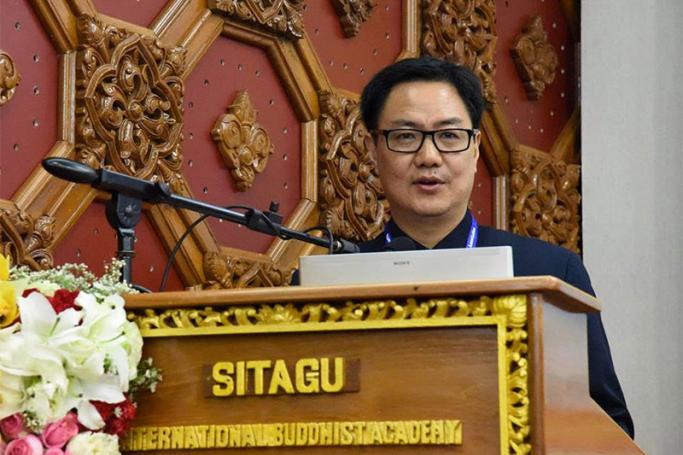With less than a month to go to the Myanmar visit of Indian prime minister Narendra Modi, one of his ministers has threatened to deport all Rohingyas.
But India's junior home minister Khiren Rijiju, a Buddhist politician from Arunachal Pradesh who earned China's ire by shepherding Tibetan leader Dalai Lama around his state this year, did not make it clear whether his government had a time frame in mind and where the Rohingyas would be deported to -- Myanmar where they hail from, or Bangladesh from where they have poossibly slipped into India.
"Either way, that will be the trickiest part of the exercise if the Modi government were to go ahead with it -- Bangladesh's current government does not want any more of the Rohingyas, and Myanmar would be unwilling as well while the Rohingyas would be hardly keen to go back to Myanmar," said Anita Sengupta, research director at Calcutta Research Group, that published a new research report on the Rohingya situation recently.
"They are truly nobody's people in a noman's land, but the diplomatic significance of an Indian bid at deporting Rohingyas cannot be missed. Both Bangladesh and Myanmar, otherwise on friendly terms with India, may be less than willing to take them back," said Jayanta Ray, National Professor and former head of the Calcutta-based Maulana Azad Institute of Asian Studies.
An estimated 40,000 Rohingya Muslims now live in India. Rijju said they were all illegal immigrants, even those 16,500 who are registered with the UN refugee agency.
"The registration with UNHCR does not make them Indian citizens. They are illegal migrants and we have asked all state governments in India to identify and deport all illegal immigrants including Rohingyas," Rijjuju told the Indian parliament last week.
The United Nations High Commissioner for Refugees (UNHCR) has issued identity cards to about 16,500 Rohingyas in India to help them "prevent harassment, arbitrary arrests, detention and deportation".
However, Mr Rijiju said the UNHCR registration was irrelevant.
"They are doing it; we cannot stop them from registering. However, we are not signatory to the accord on refugees," he said.
"As far as we are concerned the Rohingyas are all illegal immigrants. They have no basis to live here. Anybody who is an illegal migrant will be deported."
The UNHCR's India office said on Monday the principle of non-refoulement - or not sending back refugees to a place where they face danger - was considered part of customary international law and binding on all states whether they had signed the Refugee Convention or not.
The office said it had not received any official word about a plan to deport Rohingya refugees and had not got any reports deportations were taking place.
The treatment meted out to the nearly one million Rohingya in Myanmar has emerged as the most contentious human rights issue in recent years.
The Rohingyas are denied citizenship in Myanmar and classified as illegal immigrants, despite claiming roots in the Rakhine (former Arakan) state going back to centuries.
Hundreds of thousands of Rohingya have fled from Myanmar, with many taking refuge in Bangladesh, and some then crossing a porous border into India.
Many have also headed to Southeast Asia, often on rickety boats run by people-smuggling gangs.
While Bangladesh's Awami League government is opposed to letting in any more of the Rohingyas, arguing it was an over-populated country with no space for them, India has been rocked by anti-Rohingyas protests in many states where their numbers have gone up.
Mr Rijiju declined to comment on the deportation process, even as some human rights activists questioned the practicality of rounding up and expelling thousands of people scattered across the country.
Myanmar officials were not immediately available for comment.
Bangladesh officials, who complain of being burdened by the heavy flow of refugees, said India was helping it solve the crisis.
More than 75,000 Rohingya have fled to Bangladesh since October 9 after an insurgent group attacked Myanmar border police posts, prompting a security crackdown in which troops have been accused of murder and rape of Rohingya civilians.
You are viewing the old site.
Please update your bookmark to https://eng.mizzima.com.
Mizzima Weekly Magazine Issue...
14 December 2023
Spring Revolution Daily News f...
13 December 2023
New UK Burma sanctions welcome...
13 December 2023
Spring Revolution Daily News f...
12 December 2023
Spring Revolution Daily News f...
11 December 2023
Spring Revolution Daily News f...
08 December 2023
Spring Revolution Daily News f...
07 December 2023
Diaspora journalists increasin...
07 December 2023












